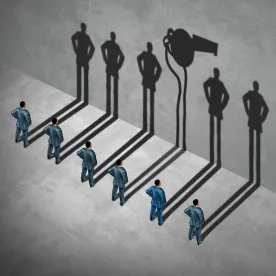Whistleblower Developments is a periodic report covering significant cases, decisions, proposals, and legislation related to whistleblower statutes and how they may impact your business. Recent developments include:
-
FY 2022 Annual Report
-
SEC Amends Complaint Against Defendant Executive to Include Allegations of Impeding and Retaliating Against a Whistleblower
-
SEC Issues Several Significant Awards in Fourth Quarter of 2022
-
Second Circuit Affirms Rejection of Whistleblower Award to Claimant Who Pleaded Guilty to Bribery Charges
-
District Court Rules that Terminating Bank Employee Involved in Scheme to Open Bank Accounts to Meet Sales Quotas Did Not Violate SOX
FY 2022 Annual Report
On November 15, 2022, the SEC released its annual report for Fiscal Year (FY) 2022. Fiscal Year 2022 was another strong year for the SEC’s Whistleblower Program, following the program’s record-breaking year in FY 2021. In FY 2022, the SEC awarded approximately $229 million across 103 awards. Though falling well short of FY 2021’s monetary total ($564 million in awards), FY 2022 was the program’s second highest year in dollars and number of awards, and the program’s highest year in number of tips — more than 12,300. The SEC has now paid more than $1.3 billion across 328 awards since the program’s inception.
The report discussed the SEC’s adoption of two amendments to the whistleblower program rules, which we previously summarized in our most recent newsletter. The first amendment allows the SEC to make awards to whistleblowers for related, non-SEC actions that might otherwise be covered by another agency’s whistleblower program, even where that other program has the more direct or relevant connection to the related action. The second amendment affirms the SEC’s authority to consider the size of a potential award as a grounds for increasing, but not decreasing, an award.
As is standard in the annual report, the SEC highlighted the program’s global reach, with international tips in FY 2022 coming largely from Canada, the U.K., Germany, China, Mexico, and Brazil. In the U.S., the highest activity in tips came from Florida, South Carolina, California, Texas, and New York.
In the report, the SEC summarized several noteworthy claims, including claims by whistleblowers who helped the SEC understand complex businesses and an unaffiliated outsider who performed “unusual effort and intensive research” into misconduct. The report also noted a decision denying an award to a claimant who provided information that resulted in the opening of an SEC investigation, but who made materially false statements during the SEC’s investigation and in the claimant’s application for an award.
SEC Amends Complaint Against Defendant Executive to Include Allegations of Impeding and Retaliating Against a Whistleblower
On November 22, 2022, the SEC filed an amended complaint in an action previously filed in 2020 in which the SEC alleged that the CEO of a private technology company had defrauded investors by falsifying the company’s bank statements to give the false appearance of millions of dollars of assets and customer revenue. The amended complaint alleges that, after a whistleblower raised concerns internally and to the SEC, the CEO and others cut off the whistleblower’s access to the company’s computer systems. The executives then accessed the whistleblower’s computer and his personal email accounts, revealing correspondence concerning the report to the SEC. The whistleblower was fired a few days later. The SEC’s amended complaint includes a claim against the CEO for violations of Section 21F of the Exchange Act and SEC Rule 21F-17(a).
SEC Issues Several Significant Awards in Fourth Quarter of 2022
-
On October 31, 2022, the SEC announced an award of more than $10 million to a whistleblower who provided assistance leading to a successful enforcement action. The whistleblower provided important documents and met twice with the enforcement staff. The SEC noted that there was a close nexus between the whistleblower’s allegations and the charges in the covered action. The whistleblower’s assistance ultimately led to the return of a significant amount of money to harmed investors.
-
On November 28, 2022, the SEC announced an award of $20 million to a whistleblower who provided new and critical information that led to a successful enforcement action. The whistleblower’s assistance enabled the SEC to more quickly and efficiently investigate the wrongdoing. In considering the amount of the award, however, the SEC noted that the whistleblower was involved in the wrongful conduct and delayed reporting for more than two years after that involvement.
-
On December 12, 2022, the SEC announced an award of more than $20 million to a whistleblower who provided new information to the SEC, met with enforcement staff multiple times, and was cooperative throughout the investigation. The whistleblower’s efforts led to a successful enforcement action. The SEC’s order noted that, prior to the whistleblower’s assistance, the staff had received information from the SEC Division of Examinations and had been investigating the misconduct for more than one year prior to receiving the whistleblower’s tip. Although much of the whistleblower’s information was already known to the enforcement staff, the SEC ordered the award on account of the whistleblower’s new information, assistance, and cooperation.
-
On December 19, 2022, the SEC announced an award of more than $37 million to a whistleblower whose information led to a successful enforcement action and a related action. The whistleblower, a company outsider, was the initial source of the company’s internal investigation, and of the SEC’s and another agency’s investigations. However, the whistleblower first submitted a tip to the SEC, then the company, and then again to the SEC within 120 days thereafter. The whistleblower was credited with being the initial source of the company’s, the SEC’s, and another agency’s investigations. The SEC further recognized that the whistleblower submitted the information to the SEC within 120 days after submitting the information to the company, consistent with Rule 21F-4(c)(3).
Second Circuit Affirms Rejection of Whistleblower Award to Claimant Who Pleaded Guilty to Bribery Charges
In Doe v. SEC, No. 21-2537, 2022 WL 16936098 (2d Cir. November 15, 2022), a whistleblower sought an award for having provided information to the SEC that led to a successful enforcement action concerning an international bribery scheme. Before he filed his application for an award, however, the whistleblower himself had pleaded guilty to bribery charges. The SEC rejected his application based on the Dodd-Frank provision providing that the SEC may not make an award to a whistleblower “convicted of a criminal violation related to” the action for which the whistleblower could receive an award. The whistleblower appealed, arguing that he had not been “convicted” because he had not been sentenced for the crime and because the bribery charges to which he pleaded guilty were not “related to” the covered action. The Second Circuit rejected both arguments, finding that: (1) one can be “convicted” without being sentenced; and (2) the SEC did not abuse its discretion in concluding that the guilty plea to facilitating bribes from the same principal briber that targeted government officials in the same country for benefits in the same industry as the scheme charged in the covered action was “related to” the bribery charged in the covered action.
District Court Rules that Terminating Bank Employee Involved in Scheme to Open Bank Accounts to Meet Sales Quotas Did Not Violate SOX
In Real-Loomis v. The Bryn Mawr Trust Co., No. 2:20-cv-0441-JDW, 2022 WL 17477552 (E.D. Pa. December 6, 2022), the plaintiff bank employee sued her former employer alleging that she had been terminated in violation of the Sarbanes-Oxley Act, among other things, for allegedly complaining to her supervisor about inappropriate sales pressure on bank employees that she believed would cause those employees to pressure customers to open bank accounts they did not need. Ironically, the plaintiff later agreed to help that same supervisor meet her sales quota by opening a joint account with her husband and purportedly forging his signature to do so. Another bank employee investigating suspicious account openings terminated the plaintiff for her role in opening the joint account with a forged signature. The court granted the bank summary judgment, rejecting the argument that complaints about “fraudulent” activity due to sales pressure suggested a violation of one of SOX’s enumerated areas of federal law. The court further found that purported whistleblowing was not a contributing factor to the termination because the employee who terminated the plaintiff did not know about her prior complaints concerning inappropriate sales pressure.







 />i
/>i

